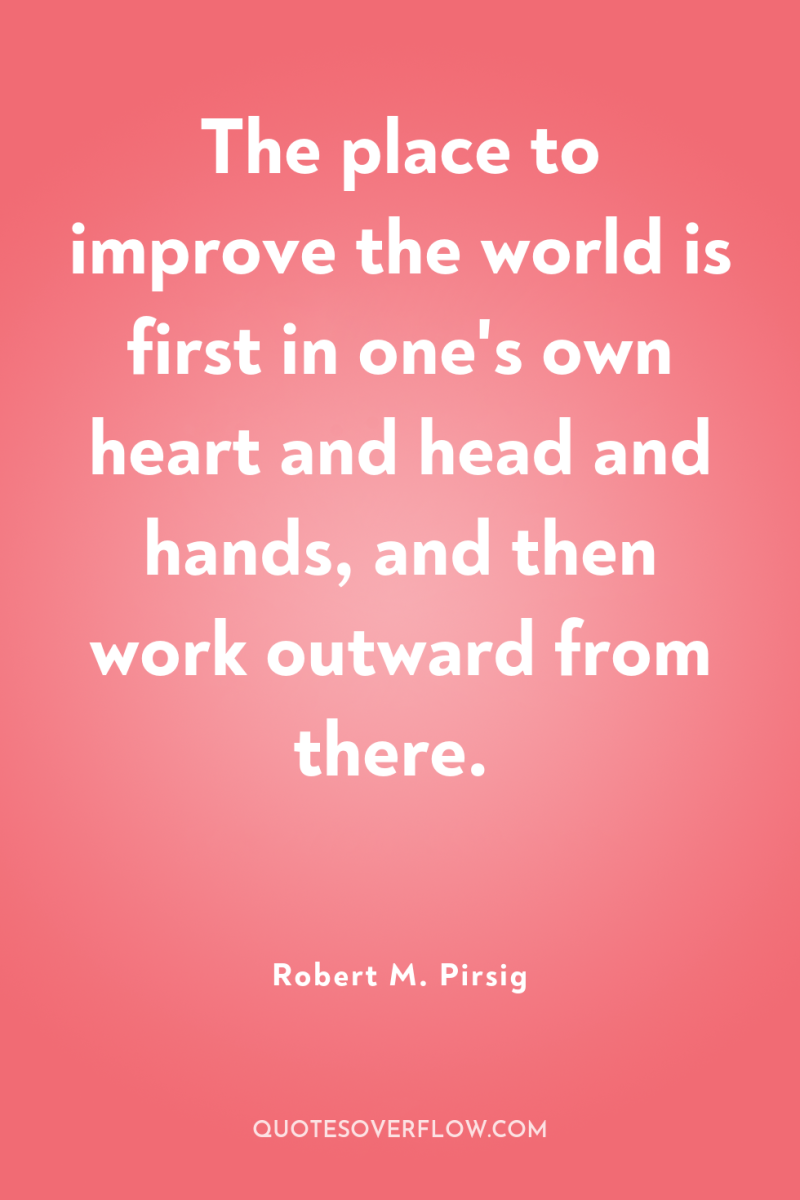
1
The place to improve the world is first in one's own heart and head and hands, and then work outward from there.Robert M. Pirsig

2
The truth knocks on the door and you say, "Go away, I'm looking for the truth, " and so it goes away. Puzzling.Robert M. Pirsig
3
What is in mind is a sort of Chautauqua..that's the only name I can think of for it..like the traveling tent-show Chautauquas that used to move across America, this America, the one that we are now in, an old-time series of popular talks intended to edify and entertain, improve the mind and bring culture and enlightenment to the ears and thoughts of the hearer. The Chautauquas were pushed aside by faster-paced radio, movies and TV, and it seems to me the change was not entirely an improvement. Perhaps because of these changes the stream of national consciousness moves faster now, and is broader, but it seems to run less deep. The old channels cannot contain it and in its search for new ones there seems to be growing havoc and destruction along its banks. In this Chautauqua I would like not to cut any new channels of consciousness but simply dig deeper into old ones that have become silted in with the debris of thoughts grown stale and platitudes too often repeated. "What's new?" is an interesting and broadening eternal question, but one which, if pursued exclusively, results only in an endless parade of trivia and fashion, the silt of tomorrow. I would like, instead, to be concerned with the question "What is best?, " a question which cuts deeply rather than broadly, a question whose answers tend to move the silt downstream. There are eras of human history in which the channels of thought have been too deeply cut and no change was possible, and nothing new ever happened, and "best" was a matter of dogma, but that is not the situation now. Now the stream of our common consciousness seems to be obliterating its own banks, losing its central direction and purpose, flooding the lowlands, disconnecting and isolating the highlands and to no particular purpose other than the wasteful fulfillment of its own internal momentum. Some channel deepening seems called for. .Robert M. Pirsig
5
If I hold my head to the left and look down at the handle grips and front wheel and map carrier and gas tank I get one pattern of sense data. If I move my head to the right I get another slightly different pattern of sense data. The two views are different. The angles of the planes and curves of the metal are different. The sunlight strikes them differently. If there's no logical basis for substance then there's no logical basis for concluding that what's produced these two views is the same motorcycle.Robert M. Pirsig
6
The cause of our current social crises, he would have said, is a genetic defect within the nature of reason itself. And until this genetic defect is cleared, the crises will continue. Our current modes of rationality are not moving society forward into a better world. They are taking it further and further from that better world. Since the Renaissance these modes have worked. As long as the need for food, clothing and shelter is dominant they will continue to work. But now that for huge masses of people these needs no longer overwhelm everything else, the whole structure of reason, handed down to us from ancient times, is no longer adequate. It begins to be seen for what it really is…emotionally hollow, esthetically meaningless and spiritually empty.Robert M. Pirsig
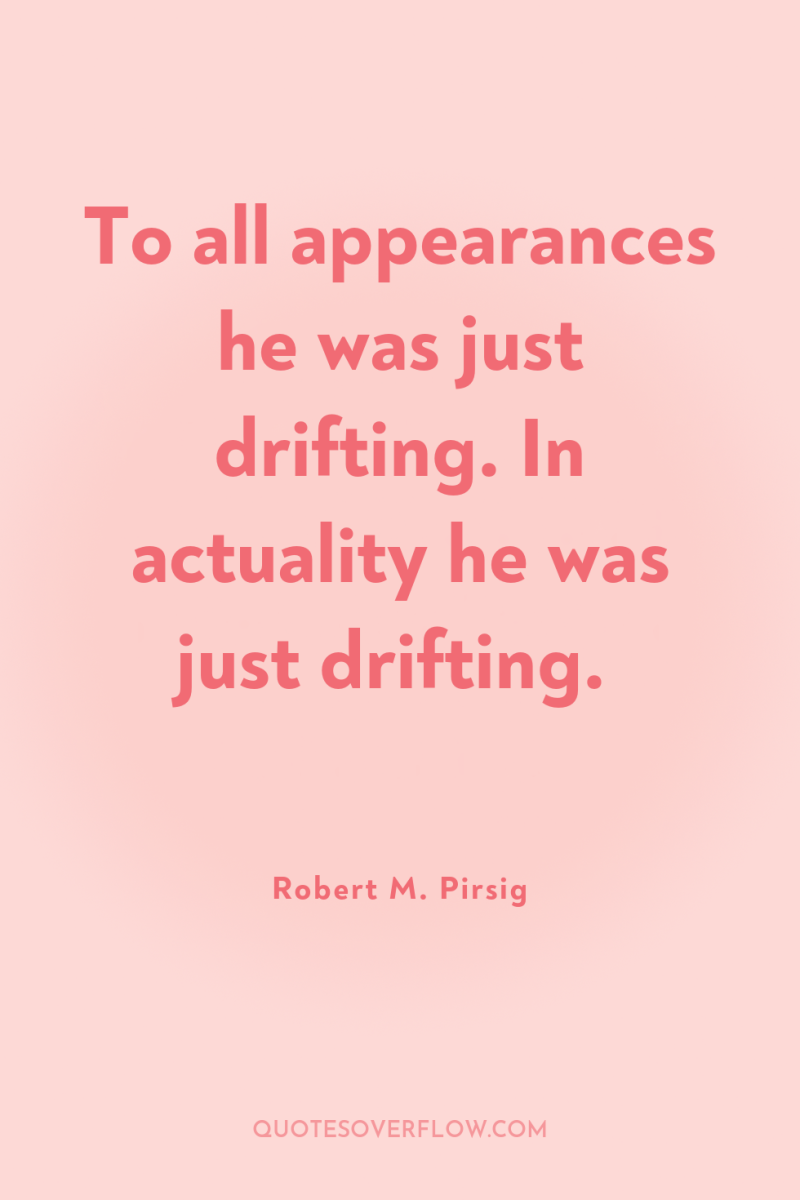
7
To all appearances he was just drifting. In actuality he was just drifting.Robert M. Pirsig
8
He felt that institutions such as schools, churches, governments and political organizations of every sort all tended to direct thought for ends other than truth, for the perpetuation of their own functions, and for the control of individuals in the service of these functions. He came to see his early failure as a lucky break, an accidental escape from a trap that had been set for him, and he was very trap-wary about institutional truths for the remainder of his time.Robert M. Pirsig

9
When one person suffers from a delusion, it is called insanity. When many people suffer from a delusion it is called a Religion.Robert M. Pirsig
10
The doctrinal differences between Hinduism and Buddhism and Taoism are not anywhere near as important as doctrinal differences among Christianity and Islam and Judaism. Holy wars are not fought over them because verbalized statements about reality are never presumed to be reality itself.Robert M. Pirsig
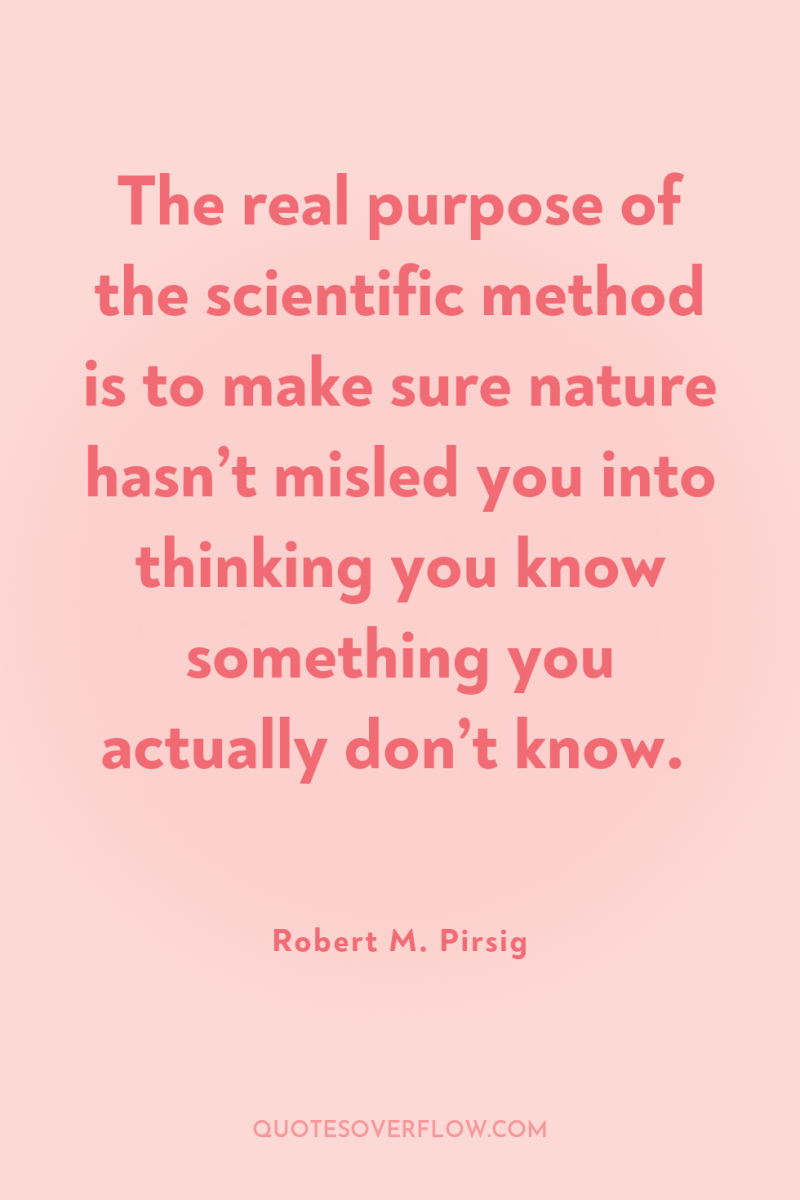
11
The real purpose of the scientific method is to make sure nature hasn’t misled you into thinking you know something you actually don’t know.Robert M. Pirsig
12
As a result of his experiments he concluded that imitation was a real evil that had to be broken before real rhetoric teaching could begin. This imitation seemed to be an external compulsion. Little children didn’t have it. It seemed to come later on, possibly as a result of school itself. That sounded right, and the more he thought about it the more right it sounded. Schools teach you to imitate. If you don’t imitate what the teacher wants you get a bad grade. Here, in college, it was more sophisticated, of course; you were supposed to imitate the teacher in such a way as to convince the teacher you were not imitating, but taking the essence of the instruction and going ahead with it on your own. That got you A’s. Originality on the other hand could get you anything — from A to F. The whole grading system cautioned against it.Robert M. Pirsig
13
Grades really cover up failure to teach. A bad instructor can go through an entire quarter leaving absolutely nothing memorable in the minds of his class, curve out the scores on an irrelevant test, and leave the impression that some have learned and some have not. But if the grades are removed the class is forced to wonder each day what it’s really learning. The questions, What’s being taught? What’s the goal? How do the lectures and assignments accomplish the goal? become ominous. The removal of grades exposes a huge and frightening vacuum.Robert M. Pirsig
14
The student’s biggest problem was a slave mentality which had been built into him by years of carrot-and- whip grading, a mule mentality which said, "If you don’t whip me, I won’t work." He didn’t get whipped. He didn’t work. And the cart of civilization, which he supposedly was being trained to pull, was just going to have to creak along a little slower without him. This is a tragedy, however, only if you presume that the cart of civilization, "the system, " is pulled by mules. This is a common, vocational, "location" point of view, but it’s not the Church attitude. The Church attitude is that civilization, or "the system" or "society" or whatever you want to call it, is best served not by mules but by free men. The purpose of abolishing grades and degrees is not to punish mules or to get rid of them but to provide an environment in which that mule can turn into a free man. .Robert M. Pirsig
15
This larger goal wouldn’t be the imitation of education in Universities today, glossed over and concealed by grades and degrees that give the appearance of something happening when, in fact, almost nothing is going on. It would be the real thing.Robert M. Pirsig
16
The fact that they were there as students presumed they did not know what was good or bad. That was his job as instructor...to tell them what was good or bad. The whole idea of individual creativity and expression in the classroom was really basically opposed to the whole idea of the University.Robert M. Pirsig
17
When spontaneity and individuality and really good original stuff occurred in a classroom it was in spite of the instruction, not because of it. This seemed to make sense. He was ready to resign. Teaching dull conformity to hateful students wasn’t what he wanted to do.Robert M. Pirsig
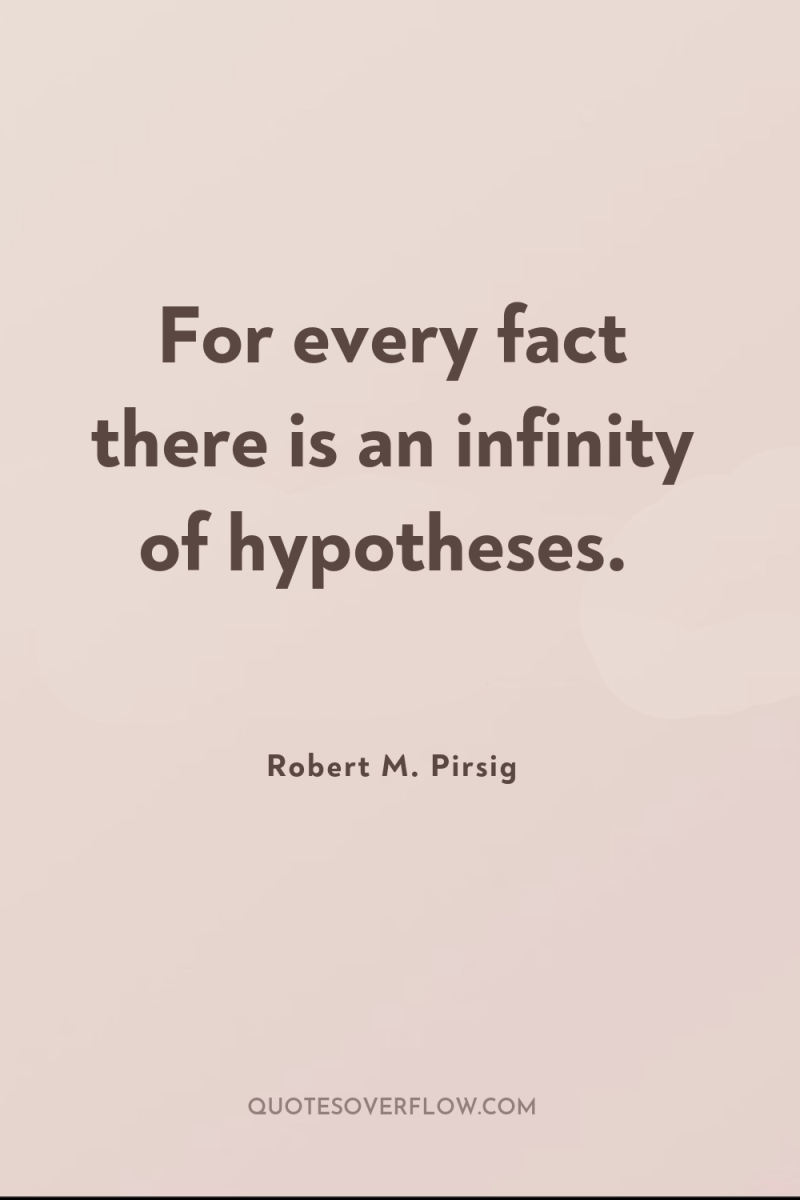
18
For every fact there is an infinity of hypotheses.Robert M. Pirsig
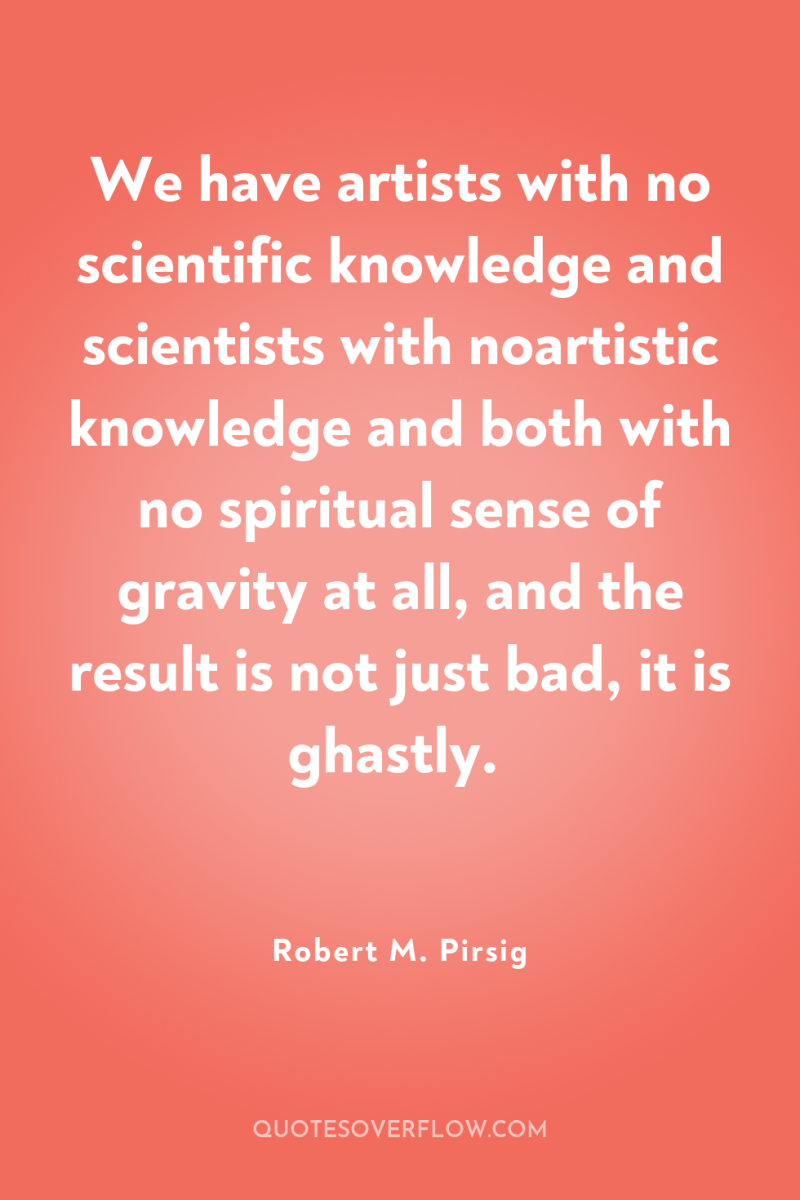
19
We have artists with no scientific knowledge and scientists with noartistic knowledge and both with no spiritual sense of gravity at all, and the result is not just bad, it is ghastly.Robert M. Pirsig
20
The TV scientist who mutters sadly, "The experiment is a failure; we have failed to achieve what we had hoped for, " is suffering mainly from a bad script writer. An experiment is never a failure solely because it fails to achieve predicted results. An experiment is a failure only when it also fails adequately to test the hypothesis in question, when the data it produces don't prove anything one way or another.Robert M. Pirsig
21
He’d no longer be a grade-motivated person. He’d be a knowledge-motivated person. He would need no external pushing to learn. His push would come from inside. He’d be a free man. He wouldn’t need a lot of discipline to shape him up. In fact, if the instructors assigned him were slacking on the job he would be likely to shape them up by asking rude questions. He’d be there to learn something, would be paying to learn something and they’d better come up with it. Motivation of this sort, once it catches hold, is a ferocious force..Robert M. Pirsig
22
Now we’ve a real intellectual impasse. Our reason, which is supposed to make things more intelligible, seems to be making them less intelligible, and when reason thus defeats its own purpose something has to be changed in the structure of our reason itself.Robert M. Pirsig
23
You can’t really think hard about what you’re doing and listen to the radio at the same time. Maybe they didn’t see their job as having anything to do with hard thought, just wrench twiddling.Robert M. Pirsig
24
I don’t know why–it’s just that– I don’t know–they’re not kin."– Surprising word, I think to myself never used it before. Not of kin–sounds like hillbilly talk–not of a kind–same root–kindness, too–they can’t have real kindness toward him, they’re not his kin --. That’s exactly the feeling. Old word, so ancient it’s almost drowned out. What a change through the centuries. Now anybody can be "kind." And everybody’s supposed to be. Except that long ago it was something you were born into and couldn’t help. Now it’s just a faked-up attitude half the time, like teachers the first day of class. But what do they really know about kindness who are not kin.Robert M. Pirsig
25
For every fact there is an infinity of hypotheses. The more you look the more you see.Robert M. Pirsig
26
Who really can face the future? All you can do is project from the past, even when the past shows that such projections are often wrong. And who really can forget the past? What else is there to know?Robert M. Pirsig
27
Definitions are the foundation of reason. You can’t reason without them.Robert M. Pirsig
28
To doubt the literal meaning of the words of Jesus or Moses incurs hostility from most people, but it’s just a fact that if Jesus or Moses were to appear today, unidentified, with the same message he spoke many years ago, his mental stability would be challenged. This isn’t because what Jesus or Moses said was untrue or because modern society is in error but simply because the route they chose to reveal to others has lost relevance and comprehensibility. "Heaven above" fades from meaning when space-age consciousness asks, Where is "above"? But the fact that the old routes have tended, because of language rigidity, to lose their everyday meaning and become almost closed doesn’t mean that the mountain is no longer there. It’s there and will be there as long as consciousness exists. .Robert M. Pirsig
29
Bouncing on beds, I remember from childhood, is a great depression reliever.Robert M. Pirsig
30
The orange turns to dull bronze light and continues to show what it has shown all day long, but now it seems to show it without enthusiasm. Across those dry hills, within those little houses in the distance are people who've been there all day long, going about the business of the day, who now find nothing unusual or different in this strange darkening landscape, as we do. If we were to come upon them early in the day they might be curious about us and what we're here for. but now in the evening they'd just resent our presence. The workday is over. It's time for supper and family and relaxation and turning inward at home. We ride unnoticed down this empty highway through this strange country I've never seen before, and now a heavy feeling of isolation and loneliness becomes dominant and my spirits wane with the sun. .Robert M. Pirsig
31
He singled out aspects of Quality such as unity, vividness, authority, economy, sensitivity, clarity, emphasis, flow, suspense, brilliance, precision, proportion, depth and so on; kept each of these as poorly defined as Quality itself, but demonstrated them by the same class reading techniques. He showed how the aspect of Quality called unity, the hanging-togetherness of a story, could be improved with a technique called an outline. The authority of an argument could be jacked up with a technique called footnotes, which gives authoritative reference. Outlines and footnotes are standard things taught in all freshman composition classes, but now as devices for improving Quality they had a purpose. And if a student turned in a bunch of dumb references or a sloppy outline that showed he was just fulfilling an assignment by rote, he could be told that while his paper may have fulfilled the letter of the assignment it obviously didn’t fulfill the goal of Quality, and was therefore worthless.Robert M. Pirsig
32
Bill arrives with a grin about something. Sure, he's got some jets for my machine and knows right were they are. I'll have to wait a second though. He's got to close a deal out in back on some Harley parts. I go with him out in a shed in back and see he is selling a whole Harley machine in used parts, except for the frame, which the customer already has. He is selling them all for $125. Not a bad price at all. Coming back I comment, "He'll know something about motorcycles before he gets those together." Bill laughs. "And that's the best way to learn, too.Robert M. Pirsig
33
Mountains should be climbed with as little effort as possible and without desire. The reality of your own nature should determine the speed. If you become restless, speed up. If you become winded, slow down. You climb the mountain in an equilibrium between restlessness and exhaustion. Then, when you’re no longer thinking ahead, each footstep isn’t just a means to an end but a unique event in itself. This leaf has jagged edges. This rock looks loose. From this place the snow is less visible, even though closer. These are things you should notice anyway. To live only for some future goal is shallow. It’s the sides of the mountain which sustain life, not the top. Here’s where things grow. But of course, without the top you can’t have any sides. It’s the top that defines the sides. So on we go–we have a long way–no hurry–just one step after the next–with a little Chautauqua for entertainment -- .Mental reflection is so much more interesting than TV it’s a shame more people don’t switch over to it. They probably think what they hear is unimportant but it never is.Robert M. Pirsig
34
I want to talk about another kind of high country now in the world of thought, which in some ways, for me at least, seems to parallel or produce feelings similar to this, and call it the high country of the mind. If all of human knowledge, everything that’s known, is believed to be an enormous hierarchic structure, then the high country of the mind is found at the uppermost reaches of this structure in the most general, the most abstract considerations of all. Few people travel here. There’s no real profit to be made from wandering through it, yet like this high country of the material world all around us, it has its own austere beauty that to some people makes the hardships of traveling through it seem worthwhile. In the high country of the mind one has to become adjusted to the thinner air of uncertainty, and to the enormous magnitude of questions asked, and to the answers proposed to these questions. The sweep goes on and on and on so obviously much further than the mind can grasp one hesitates even to go near for fear of getting lost in them and never finding one’s way out.Robert M. Pirsig
35
Our current modes of rationality are not moving society forward into a better world. They are taking it further and further from that better world. Since the Renaissance these modes have worked. As long as the need for food, clothing and shelter is dominant they will continue to work. But now that for huge masses of people these needs no longer overwhelm everything else, the whole structure of reason, handed down to us from ancient times, is no longer adequate. It begins to be seen for what it really is..emotionally hollow, esthetically meaningless and spiritually empty. That, today, is where it is at, and will continue to be at for a long time to come. .Robert M. Pirsig
36
Now anybody can be "kind." And everybody's supposed to be. Except that long ago it was something you were born into and couldn't help. Now it's just a faked-up attitude half the time, like teachers the first day of class.Robert M. Pirsig
37
We want to make good time, but for us now this is measured with the emphasis on "good" rather than on "time"....Robert M. Pirsig
38
People entered the park and became polite and cozy and fakey to each other because the atmosphere of the park made them that way. In the entire time he had lived within a hundred miles of it he had visited it only once or twice.Robert M. Pirsig
39
So we navigate mostly by dead reckoning, and deduction from what clues we find. I keep a compass in one pocket for overcast days when the sun doesn't show directions and have the map mounted in a special carrier on top of the gas tank where I can keep track of miles from the last junction and know what to look for. With those tools and a lack of pressure to 'get somewhere' it works out fine and we just about have America all to ourselves.Robert M. Pirsig
40
What’s emerging from the pattern of my own life is the for belief that the crisis is being caused by the inadequacy of existing forms of thought to cope with the situation. It can’t be solved by rational means because the rationality itself is the source of the problem. The only ones who’re solving it are solving it at a personal level by abandoning ‘square’ rationality altogether and going by feelings alone. Like John and Sylvia here. And millions of others like them. And that seems like a wrong direction too. So I guess what I’m trying to say is that the solution to the problem isn’t that you abandon rationality but that you expand the nature of rationality so that it’s capable of coming up with a solution. .Robert M. Pirsig
41
The truths Phaedrus began to pursue were lateral truths; no longer the frontal truths of science, those toward which the discipline pointed, but the kind of truth you see laterally, out of the corner of your eye. In a laboratory situation, when your whole procedure goes haywire, when everything goes wrong or is indeterminate or is so screwed up by unexpected results you can't make head or tail out of anything, you start looking laterally. That's a word he later used to describe a growth of knowledge that doesn't move forward like an arrow in flight, but expands sideways, like an arrow enlarging in flight, or like the archer, discovering that although he has hit the bull's-eye and won the prize, his head is on a pillow and the sun is coming in the window. Lateral knowledge is knowledge that's from a wholly unexpected direction, from a direction that's not even understood as a direction until the knowledge forces itself upon one. Lateral truths point to the falseness of axioms and postulates underlying one's existing system of getting at truth.Robert M. Pirsig
42
Once they got into the idea of seeing directly for themselves they also saw there was no limit to the amount they could say. It was a confidence building assignment too, because what they wrote, even though seemingly trivial, was nevertheless their own thing, not a mimicking of someone else’s.Robert M. Pirsig
43
My favorite cure for boredom is sleep. It's very easy to get to sleep when bored and very hard to get bored after a long rest.Robert M. Pirsig
44
She was strangely unaware that she could look and see freshly for herself, as she wrote, without primary regard for what had been said before.Robert M. Pirsig
45
People spend their entire lives at those lower altitudes without any awareness that this high country exists.Robert M. Pirsig
46
What is in mind is a sort of Chautauqua..that’s the only name I can think of for it..like the traveling tent-show Chautauquas that used to move across America, this America, the one that we are now in, an old-time series of popular talks intended to edify and entertain, improve the mind and bring culture and enlightenment to the ears and thoughts of the hearer. The Chautauquas were pushed aside by faster-paced radio, movies and TV, and it seems to me the change was not entirely an improvement. Perhaps because of these changes the stream of national consciousness moves faster now, and is broader, but it seems to run less deep. The old channels cannot contain it and in its search for new ones there seems to be growing havoc and destruction along its banks. In this Chautauqua I would like not to cut any new channels of consciousness but simply dig deeper into old ones that have become silted in with the debris of thoughts grown stale and platitudes too often repeated.Robert M. Pirsig
47
But the biggest clue seemed to be their expressions. They were hard to explain. Good-natured, friendly, easygoing..and uninvolved. They were like spectators. You had the feeling they had just wandered in there themselves and somebody had handed them a wrench. There was no identification with the job. No saying, "I am a mechanic." At 5 P.M. or whenever their eight hours were in, you knew they would cut it off and not have another thought about their work. They were already trying not to have any thoughts about their work on the job.Robert M. Pirsig
48
I am a pioneer now, looking onto a promised land.Robert M. Pirsig
49
If you can’t define something you have no formal rational way of knowing that it exists. Neither can you really tell anyone else what it is. There is, in fact, no formal difference between inability to define and stupidity.Robert M. Pirsig
50
He comments on how amazing it is that everything in the universe can be described by the twenty-six written characters with which they have been working.Robert M. Pirsig